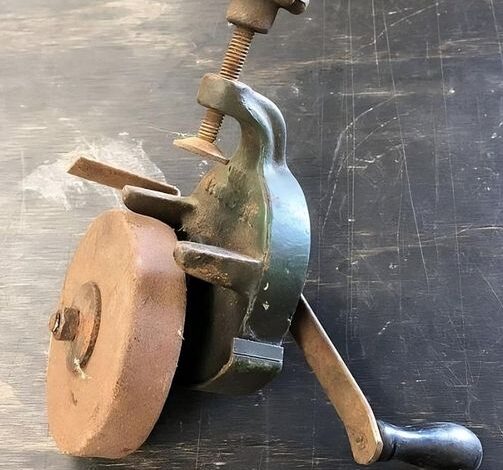Grinding to a Fine Edge: The History of Hand-Cranked Grinding Wheels

Grinding to a Fine Edge: The History of Hand-Cranked Grinding Wheels
The Essentials of Early Tool Maintenance
Hand-cranked grinding wheels like the one shown in the image were vital tools in both professional blacksmith shops and everyday households throughout the 19th and early 20th centuries. These devices, operated manually through a crank, were primarily used for sharpening metal tools and blades.
Design and Function
The typical hand-cranked grinder consists of a grinding stone mounted on a frame with a handle or crank. The user turns the handle, rotating the stone against the metal to be sharpened. This process removes minute particles from the metal, honing the edge to a sharp finish. The grinder often featured an adjustable tool rest that helped in maintaining the correct angle for sharpening.
The Evolution of Sharpening Tools
In the age before electric power tools, maintaining a sharp edge on cutting tools was labor-intensive and required skill. The development of hand-cranked grinding wheels simplified this task, making it more accessible and less time-consuming. As technology advanced, these manual tools were largely replaced by electric grinders, which offered greater precision and required less physical effort.
Modern-Day Relevance
While largely obsolete in professional settings, hand-cranked grinders are still prized by tool enthusiasts and collectors for their simplicity and the quality of edge they can produce. Additionally, they are appreciated in off-grid environments or by those who prefer traditional methods of tool maintenance.
Conclusion
The hand-cranked grinding wheel, a once ubiquitous tool, provides a fascinating glimpse into the past methods of tool care and craftsmanship. It serves as a reminder of the ingenuity of earlier generations and their ability to create effective tools with limited resources. For modern craftspeople, using such a tool can offer a deeper connection to the processes and challenges of their predecessors.




